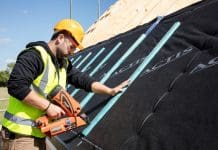Last month, the Geospatial Commission launched a Call for Evidence that encourages all stakeholders to contribute to the government’s evolving strategy to accelerate the UK’s use of location data
Location data underpins the services and conveniences we rely on every day and is crucial across many industries, including construction. For example, location data creates opportunities and efficiencies to improve sustainability, from the planning and construction of new buildings to retrofitting and better operations of existing ones.
You have the chance to provide feedback on these opportunities and challenges to shape the future geospatial strategy in the UK – and explain how location data can drive innovation in your industry.
What does the Geospatial Commission do?
We work closely with organisations across the public and private sectors in the UK to unlock the power of location data. In the next year, we will identify opportunities for location data to improve the UK property ecosystem, publish a report on how location data can support the rollout of electric vehicle chargepoints and continue to roll out the National Underground Asset Register (NUAR).
NUAR brings together geospatial expertise to help overcome the issue of accidental asset strikes, which costs the UK economy over £1.2bn a year, by providing an interactive digital map of buried asset data, accessible when, where and how it is needed by those planning and executing excavations.
The UK’s Geospatial Strategy, published in 2020, shapes these activities and provides a vision for the UK, setting out a plan to unlock the power of location data. We are now looking to refresh this strategy to renew delivery priorities for the coming years.
Contribute to the Call for Evidence to share your thoughts
The Call for Evidence is the next step in the UK’s strategy development to allow the government to hear from stakeholders on the developments, challenges and opportunities that will impact the use of location data in the coming years.
It covers three themes:
Changing context and trends: We are looking for insights about strategic changes and trends impacting the use of location data. Understanding the different sectors that the geospatial ecosystem operates in is an important step in unlocking opportunities to innovate, like identifying the homes most suitable for retrofitting, or to overcome challenges, such as identifying the best use-cases for land.
Unlocking innovation across the geospatial value chain: To create the right conditions for economic growth and innovation, we are building further evidence about emerging technologies and market trends, as well as options for deregulation and reducing burdens for organisations. These innovations are already transforming the construction and planning industry. For example, companies are combining unmanned aerial vehicles (UAVs), artificial intelligence and remote sensing to develop drones that can automatically scan entire buildings, without the need for people to be on site. Augmented and virtual reality (AR/VR) allows people to visit buildings before a single brick has been laid.
Adoption of geospatial data across the economy: Adoption of geospatial technologies has the potential to improve efficiencies and drive economic growth. We want to understand where better access to location data and geospatial services could be transformational for different sectors.
How to respond
We are encouraging everyone with an interest in location data to respond to the Call for Evidence, which can be found online. The consultation will run until 11:45pm on Monday 12 December 2022.
The answers to these questions will help inform the strategy refresh and renewed delivery priorities, which will be published in spring 2023.
Geospatial Commission
www.gov.uk/government/organisations/geospatial-commission














